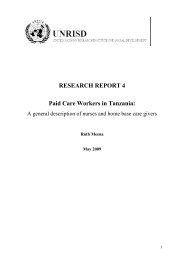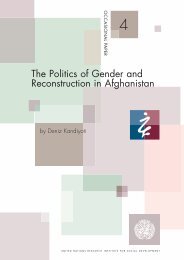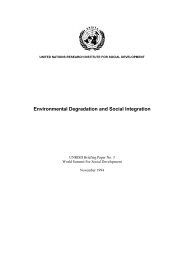Beyond Pragmatism: Appraising UN-Business Partnerships
Beyond Pragmatism: Appraising UN-Business Partnerships
Beyond Pragmatism: Appraising UN-Business Partnerships
Create successful ePaper yourself
Turn your PDF publications into a flip-book with our unique Google optimized e-Paper software.
<strong>UN</strong>RISD PROGRAMME ON MARKETS, BUSINESS AND REGULATION<br />
PAPER NUMBER 1<br />
Assessing the contribution of global health partnerships<br />
Systematic monitoring, impact assessment and evaluation (both internal and external) appear to<br />
be taken more seriously in global multipartner health partnerships (Lele et al. 2004). 50 These<br />
assessments cover a wide range of issues, going beyond investigating how far the initiatives<br />
actually meet their direct intended goals to analysing the broader implications (see annex 2). 51<br />
In particular, there is concern that the proliferation of horizontal relationships that characterize<br />
the growing number of public-private partnerships at the global level will fragment<br />
international cooperation in health and undermine the capacity of the WHO, which comprises<br />
192 governments, to set standards and global health priorities and policies, and to coordinate<br />
action. 52 Another problem is that, as indicated earlier, the growing numbers of PPPs are funded<br />
largely by philanthropic foundations, which puts into question the sustainability of these<br />
partnership initiatives, as such funding modalities are often not conducive to establishing longterm<br />
programmes at country and local levels.<br />
This suggests that greater attention needs to be given to how the growing patchwork of<br />
alliances and partnerships in health could be turned into a system of global health governance<br />
built on existing organizations, common values and agreed regimes, in order to promote global<br />
public goods in the field of health, including research and development on health, the<br />
generation and dissemination of knowledge, norms and regulatory standards. In other words,<br />
while the determinants of health and the measures to address health problems have become<br />
increasingly subject to transnational forces, intergovernmental collaboration is becoming more<br />
and more essential.<br />
This becomes clear from the assessment of global public-private partnerships that provide<br />
access to donated or discounted pharmaceutical drugs in low- and middle-income countries<br />
(Caines and Lush 2004). This synthesis report draws on studies in Botswana, Sri Lanka, Uganda<br />
and Zambia that analyse global PPPs addressing tropical diseases and HIV/AIDS. 53 With<br />
respect to global PPPs providing access to drugs for tropical (infectious and parasitic) diseases,<br />
the main findings were that the involvement of multinational R&D-based pharmaceutical firms<br />
had indeed facilitated improved availability of drugs. Regarding implementation, most PPPs<br />
were well integrated into services, with programmes following customary national systems for<br />
vector-borne diseases. In almost all systems, there had been a positive impact on health<br />
systems. The studies found no evidence of unreasonable conditionalities, impaired national<br />
ownership, distortion of national and district priorities, or unhelpful relocation of human and<br />
financial resources at central, district or community levels. 54<br />
However, regarding enhanced access to HIV/AIDS drugs, it was concluded that<br />
pharmaceutical company involvement was more complex and problematic than for tropical<br />
diseases. Donation and discount programmes for HIV/AIDS drugs examined in these studies<br />
are “embedded in an evolving, multi-faceted global debate (related to intellectual property<br />
protection, the need to stimulate innovation for new and better products, competition among<br />
R&D-based and generic companies and trade in general) as these issues relate to access to<br />
medicines for poor populations” (Caines and Lush 2004:4). Drug donation programmes remain<br />
limited in scope and have distributed rather small quantities of essential medicines, compared<br />
50<br />
51<br />
52<br />
53<br />
54<br />
Five global health programmes in which the World Bank is a partner have undergone external evaluations within the past five years<br />
(Lele et al. 2004:xii). These were the Special Programmes for Research and Training in Tropical Diseases, Global Forum for Health<br />
Research, the Joint United Nations Programme on HIV/AIDS (<strong>UN</strong>AIDS), RollBack Malaria, and the Stop TB Partnership.<br />
Two reasons, in particular, explain this wider assessment. First, business needs to monitor performance so that it can estimate the<br />
benefits derived in terms of increased sales, profits, return on investment and/or growth of market share, and the ways in which the<br />
partnership outcomes will affect business brand and reputation. For their part, the major funding foundations, governments and the<br />
World Bank are each accountable to their respective contributors.<br />
See, for example, Buse and Walt (2002); Richter (2003, 2004a); Reich (2002).<br />
The tropical diseases for which donated or discounted drugs were made available were leprosy, lymphatic filariasis, malaria,<br />
onchocerciasis and sleeping sickness.<br />
For recommendations emerging in relation to tropical disease programmes, see Caines and Lush (2004:41).<br />
22
















